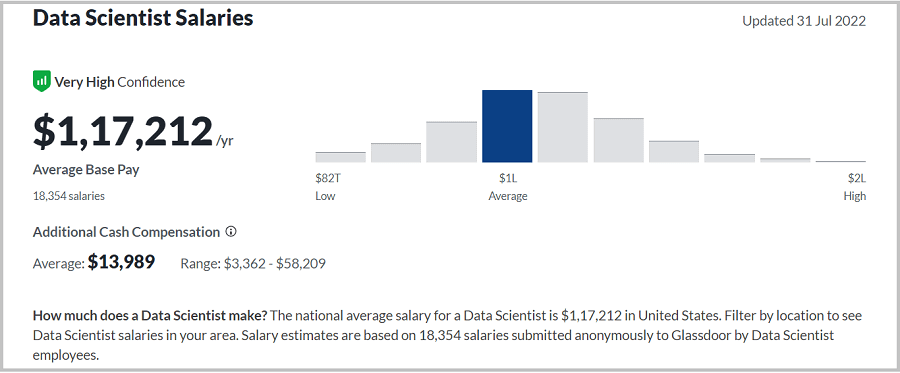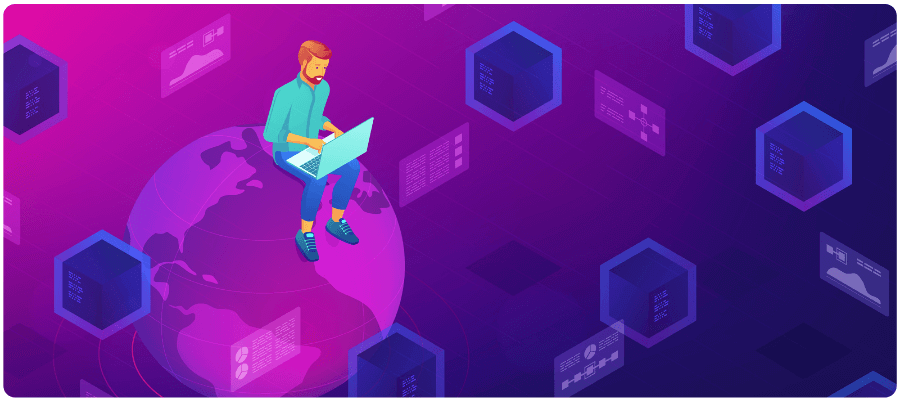There are three levels to becoming a Data Scientist from scratch. The primary level gives a student the basic knowledge of Data Science.
The second and third levels comprise the critical skills the student needs to become a successful data scientist and the average timeline required to learn data science as an expert is 3-4 years.
This guide helps you to achieve all three levels and become a Data Scientist.
📌 What you learn:
- What is data science?
- Is data science a good career?
- How long will it take to learn data science?
- How to learn data science from scratch?
- Top data science skills you need to learn
What is Data Science?
Data Science is extracting important information from data using scientific analysis and advanced techniques, and the extracted information is ultimately used in diverse fields.
Higo Bowne-Anderson (Head of Data Science at Coiled) says, “If you wanna do data science, learn how it is a technical, cultural, economic, and social discipline that can consolidate and rearrange societal power structures.”
- Glassdoor, famous worldwide for its accurate insights on jobs, has published a Data Scientist’s national average salary of $1,17,212.

- A statistical interpretation by the US Bureau of Labor Statistics states that by 2030 various Data Science careers will observe advancement in growth. The 2020-2030 Employment Projections have ranked statisticians in the 14th position and Data Scientists in the 21st position.
How Long Will It Take To Learn Data Science?
The average timeline for learning Data Science from scratch would take a minimum of 3-4 years. The timeline could be divided into primary, Intermediate, or Advanced levels.
Each level has separate subjects and fields to cover. Following are the levels of the timeline along with the factors involved in it:
1. Primary level
A student takes around 12 months to complete the Basic Level of learning Data Science. The elements to be concentrated on are:
– Data Visualization
Learning the basics of analytical and geometric mapping, datasets, etc. Data visualization is transcribing information from an image or video to word data.
– Data Basics
You should learn to manipulate scale and data using libraries like NumPy. Data Basics work through a complex system to identify usable information, then manipulate the data using various parameters and deliver data that could be easily understood.
– Continuous target variables
Learning components like linear regression. The values of such variables are turned into models for further study.
2. Intermediate Level
The student would require around 17-18 months to master the skills taught at this level.
The factors to be concentrated on are:
– Discrete target variables
The student has to excel in understanding the algorithm related to binary classification. These variables help understand several complicated regression models.
– Model Evaluation
One should be able to understand how the hyperparameter tuning system works. Using different metrics and evaluation standards, one has to understand the working process of different systems related to Data Science, like models related to Machine Learning Engineering, etc.
– Studying different models
Combining various models and the ability to study them accurately would help the student succeed at this level.
3. Advanced Level
This is the last step of the timeline of learning Data Science from scratch would be over within 46-48 months. Below are the factors involving this level:
– Work with datasets
The student must be able to work with advanced settings, like interpreting videos and images.
– Knowledge of Cloud Systems
The student should be skilled in computing software and other components. The process of cloud computing gives access to other services like artificial intelligence, essential statistics, etc.
📌Relevant read: Top cloud computing skills to learn
– Learning Neural Networks
Artificial neural networks are used in computing various systems with the help of biological neural nets.
Here’s what experts are saying about how long it might take to learn data science

Two Years, but an Ongoing Journey
My academic journey in tech paved the way for my exploration into data science. It took me a couple of years to truly feel proficient. I embraced a hands-on approach, diving into projects that aligned with my interests.
By working on real-world challenges, I could apply theoretical knowledge to practical situations. Collaborating with experts in the field and constantly seeking new learning opportunities accelerated my proficiency. Remember, proficiency is an ongoing journey, always evolving as the field of data science continues to advance.
Jay Toy, General Manager, 88stacks
Is Data Scientist A Good Career?
The job of a Data Scientist is very lucrative, and there are scopes for advancement in the future with this job:
- The career of a Data Scientist was declared the ‘Most Promising Career’ by Linkedin. According to LinkedIn, there will be as many as 11.5 million jobs in Data Science by 2026.
- ‘Indeed USA‘ published a report and a graph of the most successful Data Science career options in 2021. The Data Science career most in demand was that of a Data Architect, followed by Machine Learning Engineer, Data Analyst, and Data Scientist.
How To Learn Data Science From Scratch?
Below are steps of the learning process of Data Science from scratch:
Step 1. Basic Undergraduate Degree
The initial step to entering the learning process of Data Science would require you to get an undergraduate degree, and it is a minimum requirement these days. Your employment would highly depend on the skills you’ve gained through this degree.
The topics related to Data Science on which you could get your Undergraduate degree are:
- Data Science
- Statistics
- Computer Science
Step 2. Sharpen the acquired skills
You must improve your skill sets to become an efficient data scientist. Skills like Communication, Statistical Analysis, Machine Learning process, etc. are essential in this job. Necessary skills have been mentioned and explained later in this blog.
Step 3. Enhance AI and Language Skills
The next step in the learning stages from scratch would require the student to develop programming language skills and understand Artificial Intelligence. Combining AI with the correct use of Programming Language creates an efficient Data Scientist.
This would also help you specialize in a particular field like Database Management, and the future would increase your opportunities for advancement in Data Science.
Some of the important Programming Languages in this field are Python and SQL, and some important Data VisualizationVisualization tools are PowerBI and Excel.
Step 4. Importance of Further Education
A statistical report by Glassdoor has shown that 64% of the people working in the field of Data Science have a minimum of a Bachelor’s degree. Hence, it would be wiser to get a Master’s degree in the following related fields:
- Master of Applied Data Science
- Master of Data and Network Analysis
- M.Sc in Data Science
Step 5. Search for a Job
The final quest would be to search for an appropriate job that would officially place you on a successful Data Science career path.
You can start with entry-level jobs like Data Engineer or Business Analyst which would increase your experience in this field. In this way, you can have a successful career in Data Science.
Looking to apply for a data science job? Check out this list of top data science companies of Bangalore and offer your availability.
Relevant read: How to start a career in data science
Top Data Science Skills You Need To Learn
To successfully learn Data Science, you would require various skills other than the theoretical subjects related to the field. These fundamental skills will help you go a long way in your Data Science career.
1. Learning how to work with unstructured data
One of the most important skills a Data Scientist should have is the knowledge of how to tackle unstructured data from various unknown sources. Data is the unstructured form of information that needs to be organized correctly to get relevant information.
For instance, if a Data Scientist is working to present a marketing team with helpful observations and research, the scientist should also be an expert at tackling social media.
2. Developing Better Communication Skills
This is a non-technical skill that a Data Scientist should be able to adapt well. Communication is an essential skill for every professional. Data Scientists can identify, analyze and successfully modify the data.
But they need proper communication skills to convey the information to their team members.
They should also be able to gather information from the team members to work accordingly. Hence, Communication Skills are one of the keys to the excellence of a Data Scientist.
3. Be a SQL Expert
Writing SQL queries increases a Data Scientist’s flexibility as they could do more work than merely interpreting data from models. The SQL commands should be under one’s fingertips if one wants to have a successful career in Data Science.
Terence Shin, a Data Scientist at KOHO, suggests that learning to write SQL and execute them on the workflow management program enhances one’s skills as a Data Scientist and makes them more desirable on the job front.
4. Engineering Skills
The engineering skill is a fundamental skill that enhances other necessary skills. Feature Engineering is another form of data Wrangling that performs the basic function of extracting information from raw files.
These Engineering skills help manipulate other data and make the job easier. Data Scientists and Data Analysts succeed from enhanced engineering skills in their respective jobs.
The various engineering skills help Data Scientists to find an easier way to create convenient and efficient solutions.
5. Programming Languages
Learning various programming languages helps data scientists do their jobs efficiently. Shubh, a Data Scientist at Optum, suggests that one needs to be well acquainted with the various programming languages to learn Data Science.
Using different programming languages in the case of large databases helps manipulate data along with making the data easier to read and interpret.
6. Recommendation systems
Recommendation systems are cost-effective as they minimize the cost of transactions on various business platforms. A recommendation system helps analyze one’s preferences and then accordingly brings relevant content to their pages.
Amazon has claimed that recommendation skills have boosted Amazon’s sales by 29%. Recommendation systems are essential and powerful, as they can increase the system’s profits.
10Pie Editorial Team is a team of certified technical content writers and editors with experience in the technology field combined with expert insights. Learn more about our editorial process to ensure the quality and accuracy of the content published on our website.

